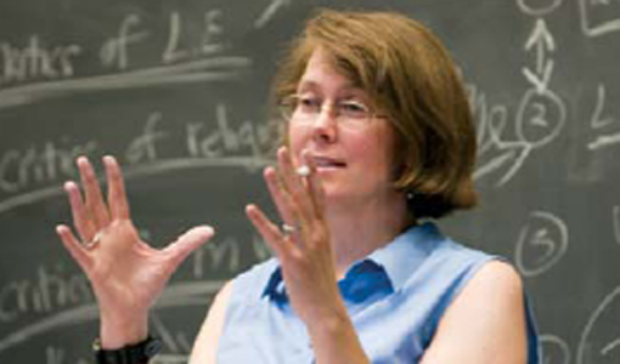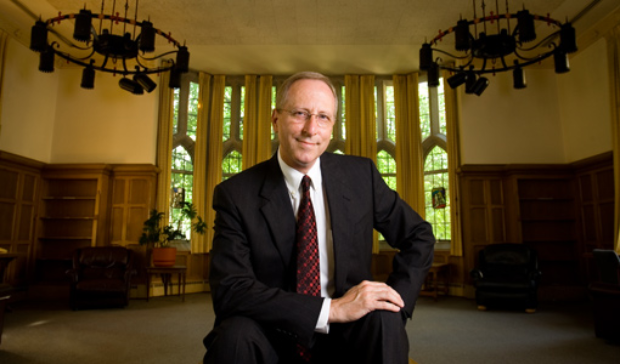Up through the Second Vatican Council, Catholic school teachers were largely religious women, priests and brothers. Particularly for religious women, their communal lives had an intentional focus that nurtured religious, intellectual and moral formation. Today, however, 95 percent of Catholic school teachers are laity facing the challenge of integrating faith and work and of living out their vocations without a formation comparable to that of their predecessors. In 1999, as a response to this need for teacher formation as well as to the U.S. Bishops’ 1998 call for a deepened commitment to sharing the Catholic social tradition, the Center for Catholic Studies created a program designed to engage questions of Catholic school teacher formation. The program, Catholic Social Teaching and Catholic Education, draws on the Church’s rich social vision and is one of several initiatives of the John A. Ryan Institute for Catholic Social Thought.
Developing interdisciplinary undergraduate and graduate courses is one way that the program seeks to give teachers grounding in a Catholic approach to education. As Dr. Deborah Ruddy, the program’s director and an assistant professor of Catholic Studies, explains, “The increasing number of under-catechized teachers and students within Catholic schools gives urgency to questions of Catholic school teacher formation and identity. The Church’s reflection on education has always emerged from a philosophical and theological understanding of the human person. The delicacy and importance of the task – that is, helping students develop their humanity and draw closer to God – is the principal reason that teaching is viewed as a noble calling within the Christian tradition. Teachers who regard their work as a vocation witness to a life of integrity for their students and help them to understand themselves as being called by God to a particular path that leads to the fullness of their humanity.”
In fall 2000, Ruddy and Dr. Margaret Reif, a professor in the School of Education, designed an interdisciplinary undergraduate course, Christian Faith and the Education Profession. Over the past few years, Ruddy has team-taught the course with both Reif and Dr. Joan Cady Brownstein, also a professor of education. The course explores foundational questions related to education and the teaching profession: What does it mean to educate the “whole person” – intellectually, morally and spiritually? What are the liberal arts, and how can education be truly liberating? What virtues are critical to being a good teacher? In addition, the course considers concepts such as the Catholic conviction about the unity of knowledge, the complementary relationship between faith and reason, and the universal human aspiration to truth as they relate to how we learn and how we teach.
Without the habit of thinking comprehensively about the faith, teachers-in-training for Catholic and other Christian schools can find it hard to see the relevance of their faith in the very substance of what and how they teach. According to Ruddy, “One challenge in preparing teachers for Catholic education is to move beyond relatively general treatments of terms such as human dignity, social justice and vocation – which in a vague form receive general approval within most schools, religious or not – in order to provide a more robust account of these concepts in a Christian context. Connecting, for example, aspects of Catholic social teaching with the core tenets of faith such as the Incarnation and the Eucharist can bring to life the uniquely integrative character of Catholic education.”
This past summer, Ruddy developed a new Catholic Studies graduate course for Catholic school teachers titled Christian Approaches to Education. Drawing from the works of figures such as St. Augustine, Hugh of St. Victor, John Cardinal Newman and Jacques Maritain, the course examines how the Catholic intellectual tradition can deepen our understanding of education. As Ruddy observes, “Because of their own experiences in the classroom, students in this course were able to see the contemporary relevance of theoretical works written in different time periods. While many teachers today, for example, would be aware of the importance of moving from external to internal motivations for learning, it was Augustine’s use of the imagination and Aquinas’ discussion of the relationship between intellect and will that enabled the students to understand how the shift from the external to the internal is critical for retention of knowledge and, ultimately, for salvation.”
Ruddy has also had the opportunity to teach Catholic school teachers through courses offered in the Murray Institute, a unique collaboration between the University of St. Thomas and the Archdiocese of St. Paul and Minneapolis. The institute, directed by Reif, seeks to address Catholic educator formation needs in light of the shift from religious to lay leadership. Through both degree and nondegree programs, the institute provides tuition-free classes that address professional development and theological formation. Since its inception in 1992, the Murray Institute has made it possible for over 400 archdiocesan employees in parishes and schools to earn graduate degrees in educational leadership, curriculum and instruction, and religious education.
Given the busy schedules of archdiocesan lay ministers and teachers who seek ongoing education, the Center for Catholic Studies has recently begun to offer a nondegree short course titled Enrichment in Catholicism. This series of bimonthly classes, taught by Catholic Studies, philosophy and theology faculty, is co-sponsored with the archdiocesan offices of Catholic Education and Formation Ministries, and of Family, Laity, Youth and Young Adults. It provides an overview of Catholicism, particularly in the light of the decrees of Vatican II, that gives participants the doctrinal and intellectual foundations needed for service in the Church. The next Enrichment in Catholicism series is scheduled for spring 2007. Ruddy hopes that this new program will contribute to the renewal of Catholic education in its service to the Church and to society.







